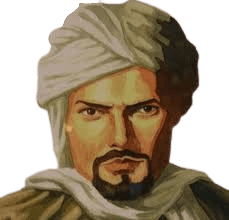Life and achievements
Early life
Ibn Battuta was born in Tangier, Morocco, on February 24th, 1304, into a family of Islamic legal scholars. He was of the Berber tribe of Lawata. Ibn Battuta was educated in Islamic law and literature principles, and he followed the Maliki school of thought, which prevailed in North Africa. This early education would be helpful in his journey, and he would serve as a judge in other positions.
Ibn Battuta was 21 when he decided to embark on his journey and chose his first journey from Hajj to Mecca. The Hajj pilgrimage was an important obligation for every Muslim, but this trip began Ibn Battuta's journey of traveling worldwide and searching for knowledge. He left Tangier in 1325 to complete the Hajj and go back home. But his journey did not stop with the Hajj. Instead, it went on to include many other countries in the Islamic world.
He started his journey in North Africa and went to Tunis and Cairo first. These experiences made him grow and become aware of society's different cultures and ways of life. He met scholars and other travelers in Cairo, and they convinced him to continue with his journey. Thus, his journeys can be characterized as discovery and spiritual journeys, as he planned to visit the Islamic shrines and study from the ulemas he met during the journey.
Despite his challenges, such as sickness and the adverse nature of the journey, Ibn Battuta did not give up. His early years, up to his teenage years, already helped him in his future travels; he knew how to be tough and bend. Each new city and region he discovered made him even more learned and experienced, which is why he is one of the world's most famous explorers.
Legacy
The travelogue of Ibn Battuta and the accounts of the medieval world are the most detailed and descriptive in medieval travel literature. His travelogue, Rihla, accounts for his journeys and expeditions, documenting the society, culture, and politics of the regions he visited. They have been helpful to historians, geographers, and scholars as they give an account of 14th-century society. This work of Ibn Battuta not only focused on the Islamic world but also included China, India, and Sub-Saharan Africa; thus, he had all the information about medieval history.
Ibn Battuta's travels are essential for the account he wrote. His travels depict the Islamic Golden Age, the age of discovery and the desire to learn. Therefore, he documented the culture and the history of the areas he traveled through. His accounts of the Islamic world depict the various parts of the world and their interconnectivity through trade, knowledge, and religion, hence painting a picture of the Islamic medieval civilization.
Ibn Battuta's work is still relevant to this generation because it opened the doors for other travelers and explorers. His travelogue has been translated into many languages, and even today, it is popular and is read by many people. Modern-day explorers and writers employ him to get ideas and compare their expeditions with his. He remains a significant influence on the human race as much as he has ignited the spirit of discovery and information search.
In his own country, Morocco, Ibn Battuta is a legendary figure. His works in literature and geography are honored in monuments, museums, and learning institutions worldwide. The Tangier airport, where he was born, is named after him to this day to honor him. Ibn Battuta has set an excellent example of how traveling can bring people of different cultures together and make people knowledgeable.
Capture your journey and share it with future generations. Create your digital legacy with Confinity Signup Now!
Storytelling and exploration—two timeless ways of preserving human experiences. →
Milestone moments
Jun 18, 1325
First Journey of Paul the Apostle
Ibn Battuta left Tangier, and his first trip was to perform the Hajj in Mecca.
It has taken almost three decades to roam the Islamic countries and other parts of the globe.
He went to North Africa, Tunis, and Cairo, and from there to Mecca. This first journey made him very adventurous and curious in his early life, as he had never been outside his home country.
These are the stepping stones for his future travels and ways of learning things.
Nov 18, 1326
First Pilgrimage to Mecca
Ibn Battuta returned to Mecca for the first time to perform the Hajj and received the title El-Hajji. He did not return home but chose to stay and continue traveling.
Before going to Mecca, he visited many cultural and historical cities and felt the atmosphere of the Islamic countries.
This pilgrimage inspired him to travel further, and he traveled to Iraq, Iran, and other countries.
Sep 18, 1333
Arrival in India
Ibn Battuta arrived in India and got a job as a judge from Sultan Muhammad bin Tughluq of Delhi. This position gave him stability and the tools he needed for the other trips.
He saw the Sultan's court, the political and social structures of the region, and the people's lives there.
His position as a judge also proved that he was an academician who could easily find a place in any society.
Jul 2, 1341
Journey to the Maldives
Ibn Battuta went to the Maldives and became a chief judge there. During his reign, he tried to enforce more strict Islamic policies.
He married a princess and had to face politics, which shows that he is a master of interpersonal relations.
This time in the Maldives, he proved that he was ready and willing to spread the word of Sharia law to new territories and people.
